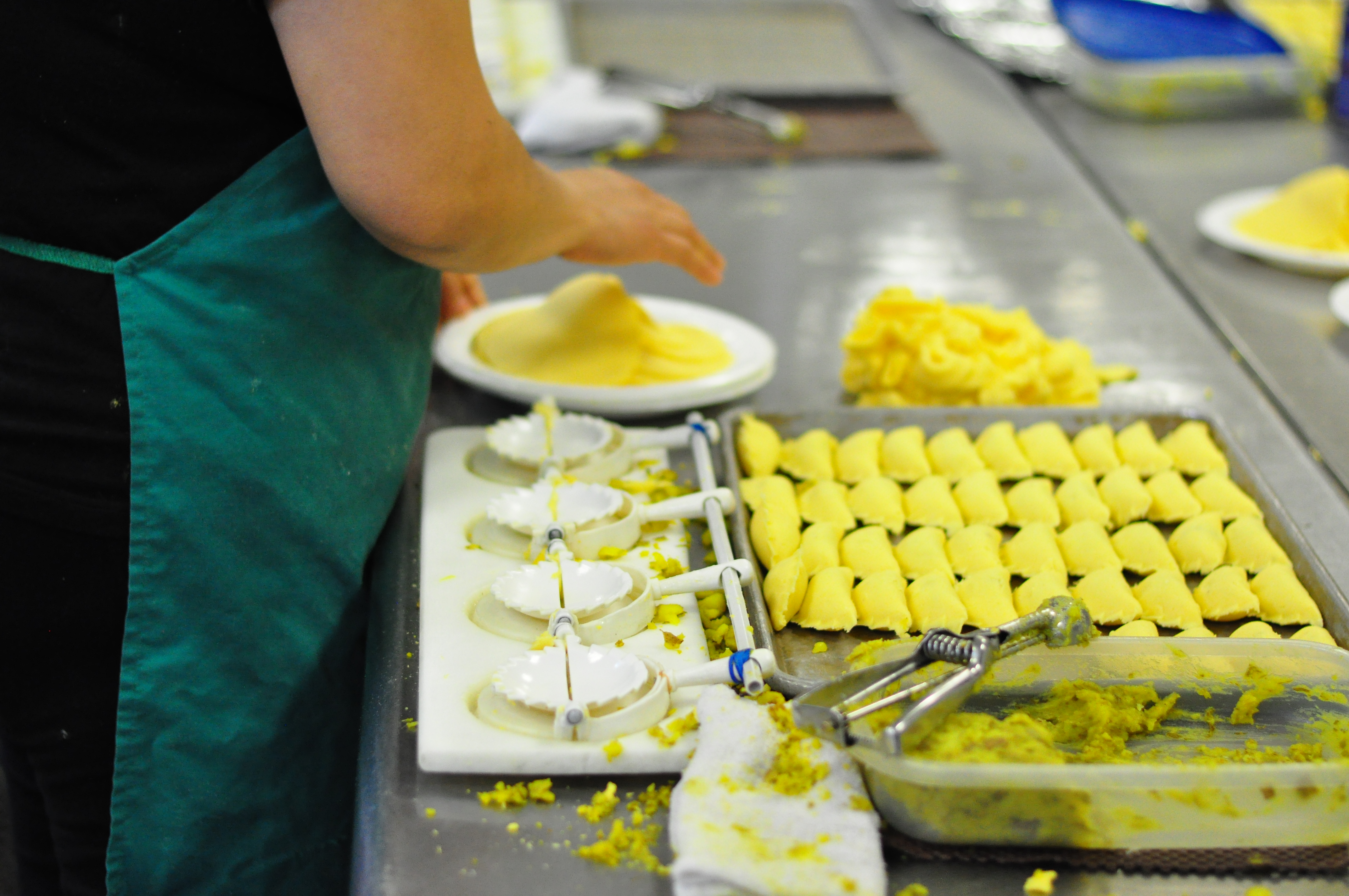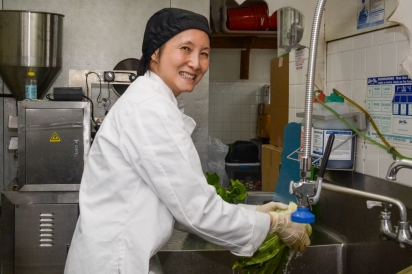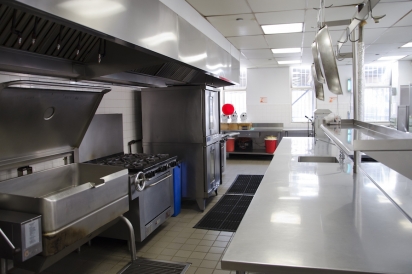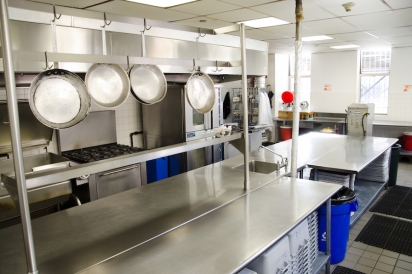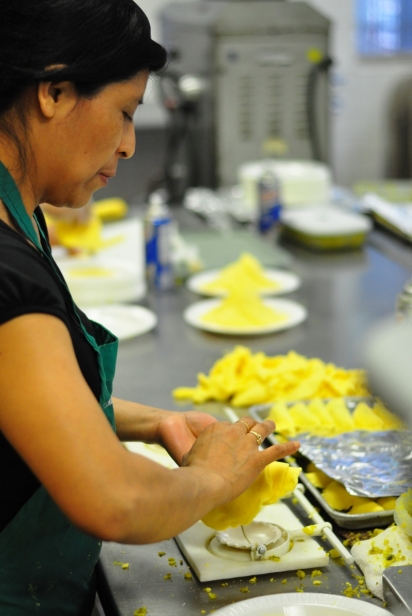Creating a Community of Food Entrepreneurs
The sprawling Women’s Housing and Economic Development Corporation (WHEDco) building on East 168th seems an unlikely place to find a group of food startups. But it’s here, inside Bronx CookSpace’s bustling commercial kitchen, that food entrepreneurs from around the tri-state area have quietly been coming for almost 20 years, finding both a place to start their businesses and a community to nurture them.
“Depending on the season I’m here every day,” said Rebecca Scott of Bronx-based Sustainable Snacks.
On any given day Scott is one of the 35 food entrepreneurs working in one of the kitchen spaces creating everything from gluten-free, vegan healthy snacks to empanadas to dog food. Scott found Bronx CookSpace thanks to a problem, lots of research and a little bit of chance.
Several years ago, after struggling to eliminate gluten and dairy from her diet as a way to manage her Lupus, the Bronx native created on-the-go snacks for herself. Made from fruits that come from an orchard in Michigan, fair trade chocolate from Peru, maple syrup from New England farms and nuts from local distributors, the snacks are full of plant-based proteins, antioxidants, Omega-3s and fiber. Simply, put each bite is a taste of crunchy deliciousness. Scott started sharing the gluten-, dairy- and soy-free snacks with her friends, who agreed on their deliciousness and encouraged her to start selling them.
Scott knew it was illegal to cook and sell food from your home and started researching commercial kitchen spaces, finding Bronx CookSpace. WHEDco’s Bronx CookSpace is the only incubator kitchen located in the Bronx. It’s also old. Don’t get me wrong, the kitchen appliances the supplies and the support Bronx CookSpace offers are all top of the line but the space has been quietly operating under the radar since 1998, way before kitchen incubators started popping up in other parts of the city and the country.
“It’s a great space, the staff is incredibly supportive and knowledgeable,” Scott said.
Started in 1998 as a workforce training and catering kitchen, the Bronx CookSpace quickly saw the need for affordable space for entrepreneurs in the food industry. In 2001, they began renting space to longer-term tenants.
“We’re working mainly with women in the neighborhood who were making food in their home kitchens and selling it, which isn’t legal and we saw a need to provide a space and also help out from the business side,” said Alix Fellman, WHEDco senior program manager for community development.
Today, the kitchen is composed mainly of food startups with 35–50 active members and the ability to take on significantly more. The Bronx CookSpace continues to serve a largely female clientele. About 66 percent of the kitchen tenants are women-owned businesses such as Scott’s.
Ramon Acevedo of Rasol Food is the longest-running tenant. The name probably doesn’t sound familiar but if you love empanadas there’s a good chance you’ve had their mini-empanadas from one of the many bakeries, bars and restaurants that sell them throughout Queens, New Jersey, Long Island, Westchester and Connecticut. Acevedo and his wife started the company in 1998 in Georgia, eventually moved to NYC, and began working out of Bronx CookSpace in 2004.
Slowly, with the help of WHEDco they expanded their business, which now includes five employees.
Bronx CookSpace doesn’t simply provide kitchen space it also offers access to technical assistance from marketing to licenses and provides in-person and online networking and events. Members fill out and application to get started which basically is a process to ensure that the kitchen is suitable for them.
“If someone doesn’t have a license or insurance we’ll work with them to get that,” Fellman said.
The membership packages start at $28 per hour and are discounted based among other things on the number of hours of kitchen use. All members also receive at least one hour of assistance from the kitchen manager each month. That assistance includes things such as product and recipe development, packaging and labeling, referrals to small business lenders, business cost analysis and more.
“It’s so valuable to work in a space with other startups where you can have useful conservations and learn from others,” Scott said.
Scott isn’t spending quite as much time in the kitchen these days. She’s only been there a couple of times a month as she works on marketing her business but she appreciates the flexibility to book a space when she needs it. The Bronx CookSpace also offers the ability to rent kitchen space by the hour with no membership required.
With nearly 20 years experience the Bronx CookSpace is looking to revamp its business plan and create new ways for its food entrepreneurs to engage with the community. This past spring they had an open house similar to an artist open studio where participating members were on hand one night to meet community members who stopped by. Bronx CookSpace is also adding staff and more technical support options. Since 2002, more than 220 food businesses have taken advantage of the kitchen space and to this day the kitchen continues to create a community for food artisans and the larger neighborhood. Last year one of the kitchen tenants, Eat2Explore even offered food demonstrations to residents at the WHEDco-owned and -managed farm at Intervale Green in Crotona Park East.
For Scott, her time at the Bronx CookSpace is coming to a bittersweet end. Now with five employees, she’s looking to move Sustainable Snacks into its own space in the former Spofford Juvenile Detention Center, which is being transformed into a mixed-use development. Scott is planning on using a co-packer model where Sustainable Snacks will train a dedicated team of Bronxites to mass produce Sustainable Snacks as well as other plant-based companies products.
“There is a long history of high-quality food being sourced or manufactured in the Bronx and then distributed to more affluent areas. The community has offered me so much since I moved here in 2012 and I want to add value by creating meaningful employment opportunities for Bronxites, offering our dedicated team access to a holistic health and wellness program and making our plant-based products available at an affordable price point within the community,” Scott said.


